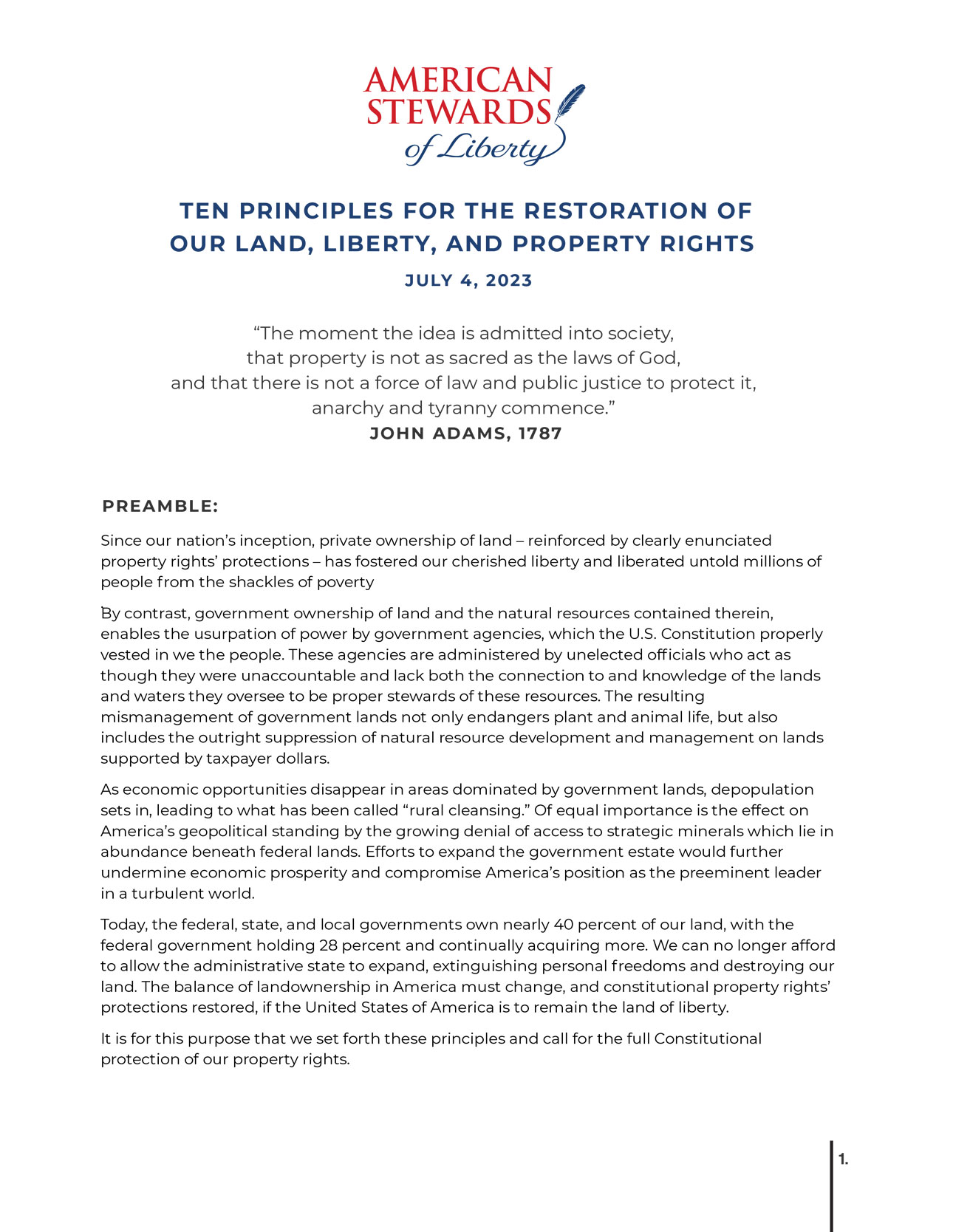10 Principles
For the Restoration of Our Land, Liberty & Property Rights
Americans’ Well-Being and Rights are Most Important
The inalienable rights of the people shall be the primary consideration of laws and regulations affecting land and these shall benefit human prosperity and well-being.
Property Rights Must be Fully Protected
Every citizen’s right to own land must have the protection provided by the Constitution so that we may secure our food, shelter, security, personal wealth, and freedom. Americans must have a reasonable means to directly challenge the infringement of their property rights to the Federal Judicial branch of government. Our individual right to own land is essential to prevent economic and political power from being centralized and corrupted.
Diminishment of Use Justly Compensated
Just compensation shall be paid by the Federal government for taking private property or any right therein. This includes not only the physical invasion of private property, but also the diminution of private property through regulations. Such actions are those that prevent private property owners from using, selling, or building on their land and by forcing private property owners to provide the public with benefits, such as through mitigation, that would otherwise be paid for by tax dollars as a condition to obtaining governmental approval for a lawful land use.
Federal Lands Managed for the People’s Benefit
Federal lands must be managed for the benefit of the American people. The principal uses of these lands shall be national security, the development and utilization of domestic energy supplies, mineral extraction, timber production, domestic livestock grazing, wildlife habitat, rights-of-way, outdoor recreation and other constructive uses.
Land Management Must be Guided by Scientific Principles
The conservation of Federal lands in a natural condition or in a condition that otherwise prohibits natural resource use and development must first satisfy the peoples’ representatives that such protection is necessary under established scientific principles and based on verifiable data and reproducible facts, and not on subjective studies and projects that cannot be replicated.
Federal Land Management Shall Benefit Local Communities
No Federal land management policies shall result in unreasonable burdens on families and small businesses, and these policies shall benefit the communities in the immediate locale of the land. To that end, the requirement for federal coordination shall be interpreted as deference to the land use policies of the States, Tribes, and local governments, to the maximum extent allowable under law.
Government Ownership and Control of Land Must be Limited
Eminent Domain shall only be utilized when an essential public purpose makes this necessary. There shall be no net increase in permanent Federal control of land and no net loss of privately owned land in the United States. Permanent government control of the land should be reduced, and unrestricted private land ownership increased.
Government Land Must be
Equally Distributed Among the States
Any new Federal land acquisition shall require the approval of the legislature of the affected state by a 2/3 vote and by a similar approval of the local jurisdictional governments. Further, no state shall be expected to bear an inequitable amount of federal acreage, and federal authorities shall begin the process to restore private-land ownership in the United States and its Territories.
Land Restored to American Citizens
Federal lands restored to private ownership can only be acquired by individual American citizens or tax-paying businesses owned by American citizens, and dispersed according to State law in such a manner as to prevent the monopolization of our natural resources and centralization of economic or political power over the American people.
Land to be Managed by the Living
Land shall be governed by the living and policies restricting land use in perpetuity should be eliminated, securing the ability of future generations to limit government and protect individual liberties.
These 10 principles were drafted by the Property Rights Task Force, July 4, 2023.

